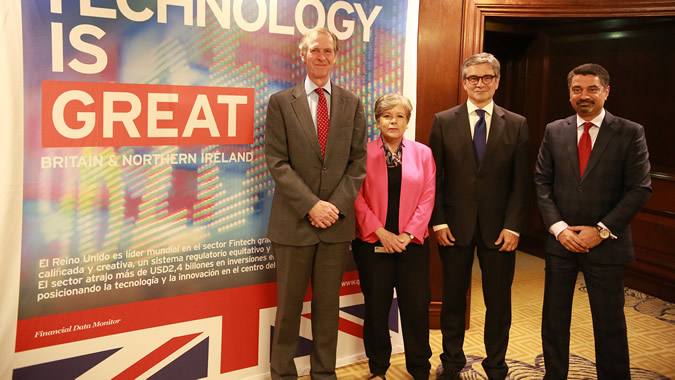ECLAC and Cambridge University Launched a Fintech Collaboration Network
The Executive Secretary of the United Nations regional organization, Alicia Bárcena, the President of Chile’s Central Bank, Mario Marcel, and the Ambassador of the United Kingdom, Jamie Bowden, inaugurated a seminar in Santiago where the joint initiative was presented.

Fintech companies, which offer financial services through the application of digital technologies, may be key to furthering financial inclusion, one of the region’s main challenges, ECLAC’s Executive Secretary, Alicia Bárcena, said on Monday, March 25 at the inauguration of a seminar where the United Nations regional organization and Cambridge University launched a joint collaborative initiative in this area, which includes the creation of a Financial Innovation Hub for Latin America.
These new companies have enormous potential to satisfy the financial needs of small and medium-sized enterprises (SMEs) and to improve the efficiency of financial systems as a whole, Bárcena explained during the event organized by the Embassy of the United Kingdom in Chile, the Cambridge Centre for Alternative Finance (CCAF) and the Economic Commission for Latin America and the Caribbean (ECLAC), with the collaboration of the U.K. government’s Department for International Trade.
Although digital financial technology companies have made significant inroads in the developed world, this continues to be an emerging industry in Latin America and the Caribbean, Bárcena indicated. Such companies are concentrated mainly in Brazil (33%) and Mexico (23%) and, to a lesser extent, in Colombia (13%), Argentina (10%) and Chile (7%). According to a 2018 estimate, a total of 1,166 companies of this kind are registered in the region, ECLAC’s most senior representative said.
“Emerging technologies,” which include digital financial technologies, constitute one of the seven areas of action set forth in eLAC2020, the Digital Agenda of Latin America and the Caribbean, Bárcena noted. For that reason, she added, “we are proud to launch this collaborative initiative with Cambridge University that seeks to create a regional network that promotes sustainable financial innovation and evidence-based regulatory innovation.”
As she also mentioned, fintech companies have a presence in business segments such as payment and remittance transactions, loans, financial management of companies and crowdfunding, among others.
Also speaking at the seminar’s inauguration were Mario Marcel, President of the Central Bank of Chile, and Jamie Bowden, the Ambassador of the United Kingdom in the country.
“This event is not just another one that fills up agendas. Today we are setting in motion a project that will be developed over the coming years and that will allow us to resolve some of the gaps that we have in terms of data, knowledge and comprehension of technological development, and also to facilitate dialogue among regulators in the region, to have a consistent, coherent approach to the regulatory framework that may be applied to this industry,” Marcel highlighted.
In his remarks, Ambassador Bowden explained that this collaborative network is the third to be established by Cambridge University thus far, after those instituted in China and Sub-Saharan Africa. The diplomat praised the choice of ECLAC, and of Chile, as a platform for the rest of Latin America and the Caribbean, given the increasing growth of fintech companies in the country “at a time when regulation is a hot topic throughout the region.”
After the opening session, a panel discussion was held about the state of development of digital financial technologies in Chile and Latin America and the role that the research center can play in the promotion of innovation.
Type
Country(ies)
-
Chile
- Latin America and the Caribbean
Related project(s)
Contact
Public Information Unit
- prensa@cepal.org
- (56 2) 2210 2040
